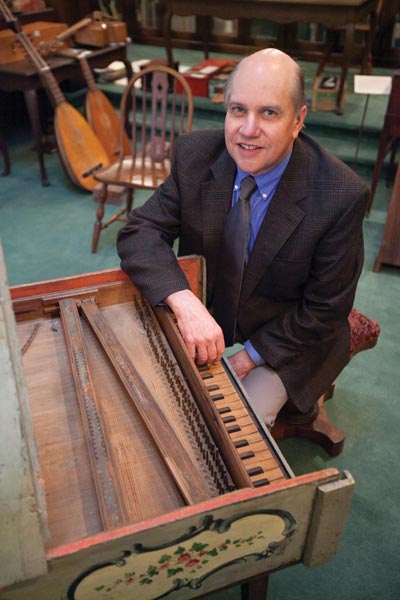Professor Illuminates Unsung Musical Prowess
When Lucille Wallace graduated from Vassar 90 years ago, she embarked on a remarkable classical music career, wowing European audiences with her mastery of the piano and harpsichord. But Wallace’s place in 20th-cen-tury music history has gone largely unnoticed.
Vassar music professor Todd Crow is hoping to change that. Over the past few years, Crow has done research on Wallace’s life and career, discovering some of her recordings at a London museum and interviewing one of her sons and others who knew her in England.
“I’d heard about Lucille through older faculty members when I came to Vassar in 1969,” Crow says, “but I couldn’t find out much about her career in the standard music texts, and it wasn’t until recently—when I was at the British Library researching information for one of my own recordings—that I discovered copious papers left by her husband, the widely known and acclaimed pianist Clifford Curzon.”
Those memoirs and letters enabled Crow to explore Wallace’s career as well as gain insight into how involved she was in her husband’s work.
“After many of Curzon’s performances, she’d write him a letter, saying she had thoroughly enjoyed it but had ‘one or two’ minor suggestions or observations,” he says. “Then, she’d proceed, for two or three pages, with critiques of his work.”

Crow says he also found copies of some of her recordings and learned she had been selected by the British Broadcasting Corporation to perform at the debut concert of its new all-classical music station in 1946. “Being chosen to perform at that concert was quite an honor, an indication of the esteem in which Lucille was held at the time,” Crow says.
Wallace had already graduated from the Bush Conservatory of Music in Chicago when she arrived at Vassar, and she concentrated her studies largely in English and history while at the college, Crow says. She did play piano-organ duets with then–music professor E. Harold Geer, and was the accompanist for the 1923 Founder’s Day production of Beggar’s Opera, and performed at her graduation ceremony.
Wallace moved to Europe to continue her music studies after she graduated, meeting Curzon while both were studying in Berlin. The two were married in 1931 and continued to perform throughout Europe for the next two decades. But Wallace eventually gave up her career to raise two adopted children.
Crow says he hopes his research will spark renewed interest in Lucille Wallace’s career. “I think I was able to get a real sense of who she was through the letters I found and by talking to her son and friends in England,” he says. “It’s exciting to feel I’ve discovered some things about her that were never known before.”
